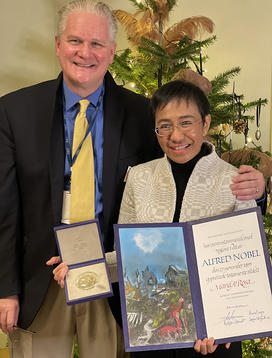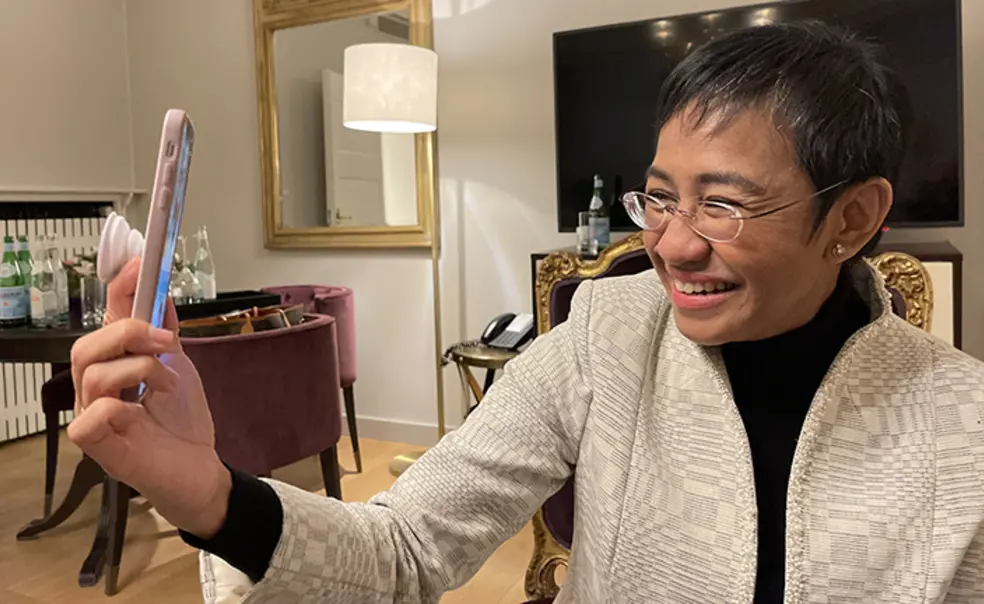Journalist Maria Ressa ’86 Receives Nobel Peace Prize in Oslo
Ressa’s class has rallied around her as she faces charges from the Philippine government

“She was a bright, shining star,” said Kirr, who lives in Marfa, Texas, and works as a producer on feature films. “She had this impish, beatific smile every time you saw her, just so happy and intellectually engaged and curious. She let you feel that you were a very, very special person to her.”
Kirr began to cry and rubbed her eyes.
“I’m sorry, I’m getting emotional because I’m just so proud of her.”
A couple of hours later, Ressa received her Nobel medal in Oslo’s cavernous city hall before a socially distanced audience that had been slashed to just 200 because of the spread of the omicron variant. It was a remarkably intimate event.
The Norwegian Nobel Committee honored Ressa and another journalist, Russia’s Dmitry Muratov, to highlight the growing threats to press freedom and democracy. In her acceptance speech, Ressa criticized social-media companies for profiting off the spread of disinformation.
“If you’re working in tech, I’m talking to you,” said Ressa. “How can you have election integrity if you don’t have integrity of facts?”
She also called for more funding for public-interest media and urged the U.S. to revoke or reform a law that treats social-media platforms like utilities.
“We can continue down the path we’re on and descend further into fascism, or we can choose to fight for a better world,” she said. “Please, ask yourself: What are you willing to sacrifice for the truth?”
Ressa’s story has resonated at a time when fact-based reporting and democracy are under threat. After Rappler exposed Philippine President Rodrigo Duterte’s murderous war on drugs, his supporters spread disinformation about Ressa and Rappler online. She faces large legal fees to defend lawsuits and criminal charges that human rights activists say are politically motivated.
With Ressa potentially facing decades in prison, Tigers have rallied in the last several years.
“When the government started attacking me, out of the blue Princetonians from different classes began to come together,” said Ressa, chatting in her suite in Oslo’s Grand Hotel during a rare break in an otherwise packed schedule. “It was first the journalists.”
Kathy Kiely ’77, a Missouri School of Journalism professor and Princeton trustee, teamed up with Tom Weber, ’89, president of the Daily Princetonian’s board of trustees, Mike McCurry ’76, and others to publish a full-page ad in the PAW urging U.S. officials to pressure the Philippine government to stop harassing Ressa.
“We started working on our connections … and I want to tell you that in maybe 72 hours, we had more than 100 names and there were some real blue-chippers,” said Kiely, who didn’t know Ressa. Those who signed included New Yorker editor David Remnick ’81 and three-time Pulitzer Prize winner Barton Gellman ’82.
When they placed a similar ad in The Washington Post, the list of names grew to more than 400. At the top was former Secretary of State George Shultz ’42, who died in February.
“When he turned 100 years old, the very last public act he did was to sign this … in support of me and Rappler,” said Ressa. “He said the biggest lesson he had learned … is that if you have trust in the room, everything is possible. But if you don’t have trust, nothing is possible.”
Anne Tergesen ’86, a fellow journalist, worked with classmates Julia Hicks de Peyster ’86 and Kiku Loomis ’86 on an online panel discussion to promote the Press Freedom Defense Fund, where alums have contributed to cover Ressa’s legal fees. Class President Elisabeth Rodgers ’86 and Vice-President Dave Hicks ’86 made and distributed buttons with Ressa’s likeness at alumni events on campus. Olivia Hurlock ’86 and Leslie Tucker ’86 raised money to help feed Ressa, who by her own admission can’t cook. Nearly 70 classmates contributed to meals delivered from Ressa’s favorite restaurants, as well as monthly deliveries of coffee and wine.
“I think people were excited to help Maria in this way because food is such a basic gesture of love,” said Hurlock. “In lockdown in her apartment in Manila, facing all these terribly frightening charges from the government, trying to run her business, write a book … I simply cannot imagine.”
At a virtual class reunion back in May, Ressa spoke about how much all of this has meant to her.
“I cannot begin to tell you how amazing Princeton and your support has been,” she said as she choked up. “Every time I get something, I think of you, and I think of the goodness of human nature.”
Frank Langfitt ’86 is NPR’s London correspondent












No responses yet